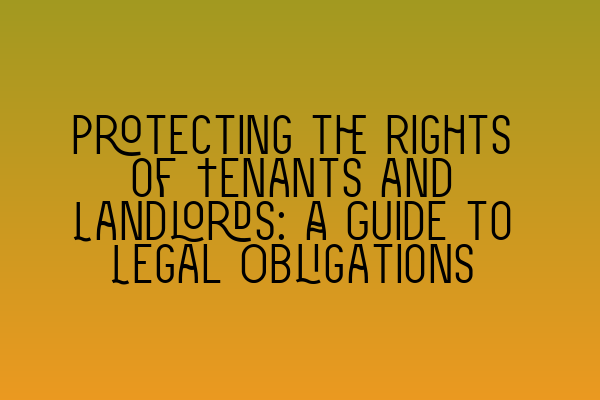Protecting the Rights of Tenants and Landlords: A Guide to Legal Obligations
Introduction:
As a solicitor specializing in property and land law, it is crucial to understand and educate both tenants and landlords about their rights and legal obligations. Whether you are a tenant looking for a safe and secure living space or a landlord seeking to protect your investment, being aware of the legal framework is essential to ensure a harmonious and lawful relationship.
In this guide, we will explore the legal obligations of both tenants and landlords, providing insights into key areas such as tenancy agreements, maintenance responsibilities, rent payment, and dispute resolution. By understanding the legal landscape, you can navigate potential pitfalls, protect your interests, and maintain a positive tenancy experience.
1. Tenancy Agreements:
The foundation of any tenancy relationship is the tenancy agreement. This legally binding contract outlines the rights and responsibilities of both the tenant and the landlord. It is important to carefully review and understand the terms and conditions before signing the agreement.
When drafting or reviewing a tenancy agreement, it is advisable to seek legal advice to ensure compliance with relevant legislation and to protect your rights. SQE Property Law & Land Law offers comprehensive legal services for both tenants and landlords, ensuring that your tenancy agreement adheres to the law and protects your interests.
2. Maintenance Responsibilities:
One of the critical aspects of a tenancy agreement is the allocation of maintenance responsibilities. Both tenants and landlords have specific obligations in maintaining the property and ensuring its habitability.
Landlords are responsible for ensuring that the property is safe, structurally sound, and complies with health and safety regulations. This includes regular maintenance, repairs, and necessary inspections. Tenants, on the other hand, have an obligation to report any defects or damage promptly and to carry out reasonable maintenance tasks, such as cleaning and minor repairs.
By understanding these maintenance responsibilities, tenants and landlords can avoid disputes and maintain a well-maintained property. For further guidance on maintenance obligations, refer to our related article on SQE 1 Practice Mocks FLK1 FLK2.
3. Rent Payment:
Rent payment is a fundamental aspect of the tenancy agreement. Both tenants and landlords have obligations regarding rent payment, and it is essential to understand these to avoid disputes or legal issues.
As a tenant, it is crucial to pay your rent on time and in the manner specified in the tenancy agreement. Failure to do so may result in legal consequences, such as eviction. Likewise, landlords must provide a rent payment schedule and adhere to any rent increase regulations.
If you are a tenant facing financial difficulties, it is essential to communicate with your landlord to explore possible solutions. Early communication can often prevent more significant problems down the line. Seeking legal advice from SQE Property Law & Land Law can provide you with the necessary guidance and support in navigating rent payment issues.
4. Dispute Resolution:
Despite best efforts, disputes can arise between tenants and landlords. It is essential to understand the dispute resolution mechanisms available to both parties to maintain a constructive relationship and avoid costly legal proceedings.
Mediation and arbitration are alternative dispute resolution methods that offer a less adversarial and more cooperative approach to resolving disputes. In these processes, a neutral third party facilitates communication and negotiation between the tenant and landlord, aiming to find a mutually agreeable solution.
If dispute resolution attempts are unsuccessful, legal action may be necessary. In such cases, it is imperative to seek expert legal advice tailored to your specific circumstances. SQE Property Law & Land Law offers specialized services to both tenants and landlords facing legal disputes, ensuring the protection of your rights and interests.
Conclusion:
Protecting the rights of tenants and landlords is paramount in fostering a positive and legally compliant tenancy relationship. By understanding your legal obligations, seeking professional advice, and engaging in open communication, you can ensure a harmonious and enjoyable tenancy experience.
Remember, this guide serves as a general overview of the legal landscape surrounding tenancy agreements, maintenance responsibilities, rent payments, and dispute resolution. For more specific guidance and tailored support, SQE Property Law & Land Law offers comprehensive legal services to meet your individual needs.
For further resources and information on legal examinations and preparation courses, refer to our related articles on SQE 1 Practice Exam Questions, SQE 2 Preparation Courses, and SQE 1 Preparation Courses. Stay informed about important dates and deadlines by visiting our article on SRA SQE Exam Dates.
Contact SQE Property Law & Land Law today to ensure the protection of your rights as a tenant or landlord. Our team of expert solicitors, writers, and SEO experts are here to offer you the legal support and guidance you need to navigate the complex world of property law.
